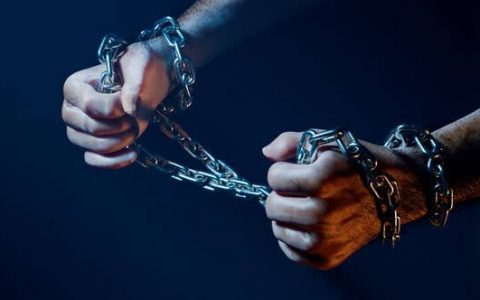LIMITED LIBERTY

LIMITED LIBERTY- LIBERTY WITH SELF-GOVERNMENT, SELF – CONTROL, SELF – RESTRAINT AND TEMPERAMENT
LIBERTY IS DEFINED BY DICTIONARY AS:
- The condition of being free from control or restrictions.
- The condition of being free from imprisonment, slavery or forced labour.
- The condition of being free to act, believe or express oneself as one chooses.
Everyone has the right to life, liberty and security of person
Until you preach the gospel and people are asking are you saying we can go and be sinning, you have not preached the same gospel that Paul preached.
It was in respect of this insinuation and misconception that made Paul ask and answer the question in Rom 6.
Rom 6:1 KJV What shall we say then? Shall we continue in sin, that grace may abound?
Rom 6:15 KJV What then? shall we sin, because we are not under the law, but under grace? God forbid.
It is a known fact that Christians have been made free. We were made free from the following:
Sin: dominion of sin, punishment, guilt, condemnation due to sin Rom 6: 18; Rom 6: 14, Rom 8: 1
Rom 6:18 KJV Being then made free from sin, ye became the servants of righteousness.
Rom 6:14 KJV For sin shall not have dominion over you: for ye are not under the law, but under grace.
Rom 8:1 KJV There is therefore now no condemnation to them which are in Christ Jesus, who walk not after the flesh, but after the Spirit.
– Satan: his authority and bondage
– the law: as an instrument of righteousness
THE QUESTION:
Is our liberty explicit, all encompassing and absolute?
JUDE
Jud 1:4 KJV For there are certain men crept in unawares, who were before of old ordained to this condemnation, ungodly men, turning the grace of our God into lasciviousness, and denying the only Lord God, and our Lord Jesus Christ.
Turning the grace of our God into lasciviousness] Making the grace and mercy of God a covering for crimes intimating that men might sin safely who believe the Gospel, because in that Gospel grace abounds
Abusing the doctrines of grace so as to give indulgence to corrupt and carnal propensities. That is, probably, they gave this form to their teaching, as Antinomians have often done, that by the gospel they were released from the obligations of the law, and might give indulgence to their sinful passions in order that grace might abound
PAUL
Gal 5:13 KJV For, brethren, ye have been called unto liberty; only use not liberty for an occasion to the flesh, but by love serve one another.
EXPLANATION
Freedom from Jewish rites and ceremonies;
The idea is, “You are called to liberty, but it is not liberty for an occasion to the flesh. It is not freedom from virtuous restraints, and from the laws of God. It is liberty from the servitude of sin, and religious rites and ceremonies, not freedom from the necessary restraints of virtue.” It was necessary to give this caution, because:
(1) There was a strong tendency in all converts from paganism to relapse again into their former habits. Licentiousness abounded, and where they had been addicted to it before their conversion, and where they were surrounded by it on every hand, they were in constant danger of falling into it again.
A bare and naked declaration, therefore, that they had been called to liberty, to freedom from restraint, might have been misunderstood, and some might have supposed that they were free from all restraints.
(2) It is necessary to guard the doctrine from abuse at all times. There has been a strong tendency, as the history of the church has shown, to abuse the doctrine of grace. The doctrine that Christians are “free;” that there is liberty to them from restraint, has been perverted always by Antinomians, and has been made the occasion of their indulging freely in sin.
And the result has shown that nothing was more important than to guard the doctrine of Christian liberty, and to show exactly what Christians are freed from, and what laws are still binding on them.
Paul is, therefore, at great pains to show that the doctrines which he had maintained did not lead to licentiousness, and did not allow the indulgence of sinful and corrupt passions.
EXPLANATION
Ye have been called unto liberty] A total freedom from all the burthensome rites and ceremonies of the Mosaic law. Only use not that liberty for an occasion to the flesh.
By flesh, here, we may understand all the unrenewed desires and propensities of the mind; whatsoever is not under the influence and guidance of the Holy Spirit of God.
Your liberty is from that which would oppress the spirit; not from that which would lay restraints on the flesh.
Some errors in teaching
The Gospel proclaims liberty from the ceremonial law: but binds you still faster under the moral law.
To be freed from the ceremonial law is the Gospel liberty; to pretend freedom from the moral law is Antinomianism.
They think that Christians are still bound to the moral laws of ten commandments.
This is contrary to Rom 7:6 that says we are not to be regulated by old dictates of the letters but by the promptings of the Spirit.
What we have now is a law of love or commandment of love.
Christ said the Mosaic law says thou shall love your neighbour but hate your enemies but He said nope you love your neighbour as yourself.
Then He told the disciples to love one another as I have loved you. Then John says a new command is we love one another.
But as we move into the New Testament proper, we are not commanded, compelled or taught to love. Why? Because we have the love of God in us and so we just live it out Rom 5: 5.
Explanation
The doctrine of Christian liberty may bc abused, or used as an occasion to the flesh, and to fulfill the lusts of it; when under a pretense thereof men think themselves exempt from obedience to the civil magistrate, which is using this liberty as a cloak of maliciousness; or that they are free from obedience to the law of God, as a rule of walk and conversation; or from subjection to the ordinances of the Gospel;
1Co 8:9 KJV But take heed lest by any means this liberty of yours become a stumblingblock to them that are weak.
WHO ARE THE WEAK IN FAITH?
Rom 14:1 KJV Him that is weak in the faith receive ye, but not to doubtful disputations.
They are those christians who had scruples about the propriety of certain things, or that might have special prejudices and feelings as the result of education or former habits of belief
Gospel liberty consists in three things, freedom from the Mosaic yoke, from sin, and from slavish fear.
Christian freedom is not to be abused for selfish ends. Paul treats this subject at length in 1Co 8:0 ; Rom 12:25 , Rom 12:26 (refs3) . Individual liberty is subject to the law of love and mutual service
he owns they had a liberty, or a right, or power, as the word may be rendered, of eating, or not eating, as they pleased; but then they ought to be cautious, lest they should be the means of offending, or causing to offend, such who were weak in the faith, and had not that knowledge of Christian liberty they had
The “liberty” or power ἐξουσία exousia here referred to was that of partaking of the meat that was offered in sacrifice to idols; 1Co 8:8. A man may have a right abstractly to do a thing, but it may not be prudent or wise to exercise it.
PETER
1Pe 2:16 KJV As free, and not using your liberty for a cloke of maliciousness, but as the servants of God.
Here our apostle answers an objection, which he foresaw the Christian Jews ready to make against this duty of subjection, namely, “that they were a free people, as Jews, and ought to preserve their liberty, and own no governors that were not of their own nation: and as Christians they looked upon themselves as Christ’s freemen:” whereas Christian liberty exempts no man from the duty of civil subjection:
The liberty Christ has purchased for believers is a freedom from sin and Satan, from sinful servitude: Christ makes all his subjects free, but it is with a freedom from spiritual bondage, and not from civil subjection;
Consequently, to plead our Christian liberty in bar to that obedience which we owe our superiors and governors, either civil or ecclesiastical, is to use our liberty for a cloak of maliciousness, and as a covering for that disobedience which is hateful to God, and injurious to mankind, as being destructive of order and government, which is the beauty and the bond of human society.
The apostle has reference to an abuse of freedom, which has often occurred.
The pretense of these who have acted in this manner has been, that the freedom of the gospel implied deliverance from all kinds of restraint; that they were under no yoke, and bound by no laws; that, being the children of God, they had a right to all kinds of enjoyment and indulgence; that even the moral law ceased to bind them, and that they had a right to make the most of liberty in all respects. Hence, they have given themselves up to all sorts of sensual indulgence, claiming exemption from the restraints of morality as well as of civil law, and sinking into the deepest abyss of vice.
Not a few have done this who have professed to be Christians; and, occasionally, a fanatical sect now appears who make the freedom which they say Christianity confers, a pretext for indulgence in the most base and degrading vices.
The apostles saw this tendency in human nature, and in nothing are they more careful than to guard against this abuse.
The man possessed by the new sense of freedom in Christ might think it strange to be the servant of men, and of such men as heathen rulers were.
Peter guards his readers against this secret danger of making their liberty in Christ a plea for insubordination in the State, and presents it both as a reason for order and subjection, and as the spirit in which these duties should be rendered.
Because they were free they were to be submissive; for (the ‘and’ introduces an explanation of the ‘free’) their freedom was not to be used as a means for concealing or palliating wickedness, and they themselves, while free, were also God’s bond-servants and under obligation to fulfill His will. ‘
The freedom of Christians is a bond freedom, because they have been set free in order to be bond-servants to God; and a free bondage, because they obey God and Magistrate not of constraint, but spontaneously’
ADVICE
Rom 6:13 KJV Neither yield ye your members as instruments of unrighteousness unto sin: but yield yourselves unto God, as those that are alive from the dead, and your members as instruments of righteousness unto God.


